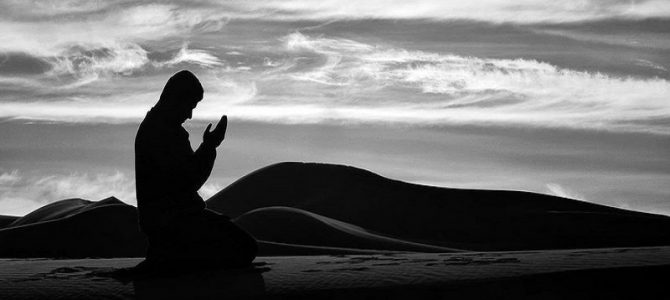Question 382: What if someone has reverted to Shia Islam but due to his Parents, he has to break some of his fasts or all the fasts on Sunni time. He, somehow, manages to do Sehri on Shia time, but sometimes breaks his fast on Sunni time. Does Allah still accept it considering his problem of not letting his parents know about it or he has to give fidiya? If yes, how much fidiya? Or he has to fast again in future when he can easily, as a remedy of those broken on Sunni time? So, what is the ruling on Breaking our fast after disappearing redness in the sky?
Answer 382: Fasting means that a person must, in obedience to the commands of Allah, refrain, from the time of Adhan for Fajr prayers up to Maghrib, from the things which invalidate the fast.[1]
To further explain, just before dawn a column of whiteness rises upwards from the east. It is called the first dawn. When this whiteness spreads, it is called the second dawn, and the prime time for Fajr prayers.[2] It is exactly the time to refrain from the things which invalidate the fast. Maghrib is the time when the redness in the eastern sky appearing after sunset disappears in the horizon.[3] This is the beginning of Maghrib time and the end of the time for imsak.
Therefore, as per the foregoing explanation, there is no imsak time other than the time between the Adhan for Fajr prayers and the Adhan for Maghrib prayers.
The grand jurists have said that in order to ensure that one has been fasting throughout this time, he should, as a matter of precaution, begin abstaining a little earlier than the Adhan for Fajr prayers, and continue to refrain for a little after Maghrib, from acts which invalidate a fast.
What follows below is an answer to a similar question from Grand Ayatollah Khamenei:
Question: Given that the cities are developing and becoming larger every day and it is not possible to ascertain the exact time of Fajr, kindly let us know about the exact time of imsak for Fast and Fajr prayer.
Answer: The believers are asked to exercise precaution about imsak and the time for Fajr prayer. So, they should refrain from invalidating things from Adhan time as declared by the media and should offer their Fajr prayers five to six minutes after the Adhan for Fajr prayers.[4]
Note: Ayatollah Bahjat (ra) said: according to a mustahab precaution, for breaking your fast you need to wait till the redness in the eastern sky appearing after sunset disappears in the horizon. This means, if you are unable, due to observing taqiyyah, to wait till the redness disappears and are compel to break your fast on that time, your fast would be considered as valid.[5]
According to most of maraja’, you have to break your fast when the redness in the eastern sky appearing after sunset disappears in the horizon. Therefore, if you break your fast under duress (as you are compelled by your parents) before disappearing the redness (i.e. according to sunni time) you have to compensate your fast later, however Allah (swt) would accept it and there is no need to give Kaffarah. But, according to Ayatollah Bahjat (ra), your fast performed in this state is treated as valid. As a result, if you are following another marja’ you are able to act only in this issue based on the Ayatollah Bahjat’s fatwa.
The following are some recommendations you are supposed to observe in order to break your fast after disappearing the redness in the sky (i.e. according to Shia time):
– As it is mutahab to break your fast after prayers you should try to offer mustahab or qadha prayers.[6]
– Try to recite some verses of the holy Quran specially Surah al-Qadr or duas, Salawat or any kinds of Dikr.[7]
– Making Wudu.
– Making any excuses in order to refrain eating or drinking on that time.
If there is no possibility to do the above mentioned or other recommendations you don’t have to cause any distress and discomfort to your parents as it is forbidden.[8]
For further information, please refer to the following answer:
Index: Things from which a person keeping fast must abstain & Kaffarah (Expiation), answer 372.
Index: Studying in the month of Ramadhan is not a valid excuse to escape fasting, answer 572.
Index: Using Asthma Inhaler does not break the Fast, answer 575.
Index: Number of things which are disapproved (Makruh) for a person observing fast, answer 566.
Index: Fasting and prayers of a traveler who travel after Zuhr, answer 384.
Index: Qada Fast for a person reverted to Islam, answer 196.
Index: Rules of prayers and fasting performed without ghusl, answer 034.
Index: Fast in countries with long days, answer 106.
Index: Niyyat for Fasting: How to make intention to Fast Ramadan, answer 627.
Index: Rules concerning tooth brush (Miswak) during fasting, answer 391.
[1] – Tawzih al-Masail (with annotation by Imam Khomeini), vol.1, pg. 880.
[2] – Ibid, vol.1, pg.411
[3] – Khomeini, Sayyid Rohullah Musavi, Tawzih al-Masail (by Imam Khomeini), pg.164, issue No.730, First, 1436 A.H; Jawahir al-Kalam, Vol. 16, Pg. 384.
[4] – Tawzih al-Masail (with annotation by Imam Khomeini), vol.1, pg.440; Khamenei, Sayyid Ali, Answers to Jurisprudential Questions, pg. 73, Office of Grand Ayatollah Khamenei in Qom, Qom, Iran, First, 1424 A.H.
[5] . Tawzih al-Masael (with annotation of Imam Khomeini (ra)), Vol. 1, Pg. 407, Q 735.
[6] . Wasael al-Shia, chapter 7, rules concerning fast; Sayyid Sistani (ha), issue 1718; Tawzih al-Masael (with annotation of Imam Khomeini (ra), Vol. 1, Pg. 969; Tabatabaee, Yazdi, Sayyid Muhammad Kazem, al-Urwa al-Wuthqa, Vol. 2, Pg. 213.
[7] . Wasael al-Shia, Vol. 10, Pgs. 149-151; Jawahir al-Kalam, Vol. 11, Pgs. 384-385.
[8] . Imam Sadiq, peace be upon him, said: “If there was anything less than “fie” to cause distress and discomfort to parents, he would prohibit it and “fie” is the lowest level of hurting parents. One of the instances of causing distress is to gaze at the parents. See: Muhammad bin Ya’qub, Usul-e Kafi (translated by Mustafavi), vol.4, pg. 50, Islamic Book Store, Tehran, 1st edition.










